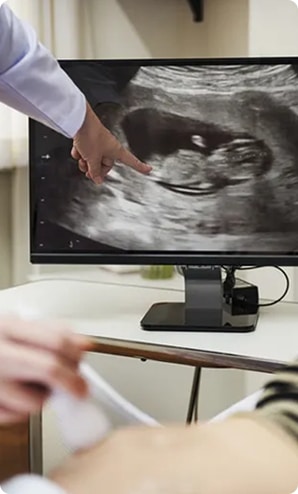Placental Abruption
Placental abruption is an uncommon and serious condition that can cause pain and bleeding for the mother and oxygen deprivation for the baby. Placental abruption, also called abruptio placentae, occurs when the placenta, which carries nutrients and oxygen to the baby, separates from the uterus before the completion of the second stage of labor. It differs from placenta previa, which occurs when the placenta covers part or all of the uterine opening.
Home > Pregnancy Complications > Placental Abruption
- Last Updated Date: December 5, 2023
Types of Placental Abruption
(Abruption Placenta)
Four major types of placental abruption exist, according to the Cleveland Clinic.
- Partial placental abruption occurs when the placenta does not entirely separate from the uterine wall.
- Complete placental abruption occurs when the placenta separates completely from the uterine wall.
- Complete placental abruption generally results in significant bleeding.
- Revealed placental abruptions have visible vaginal bleeding.
- Concealed placental abruptions have little or no visible vaginal bleeding because the blood is trapped between the placenta and uterine wall.
Placental Abruption and Premature Birth
According to March of Dimes, placental abruption is a factor in roughly 10% of premature births. A premature birth is one that takes place before 37 weeks gestation. Preterm babies may need to spend additional time in special neonatal care units or intermediate care nurseries in the hospital for monitoring, as they may have difficulty breathing and lack reflexes for sucking or swallowing. Premature infants may also have metabolic, circulatory, and gastrointestinal problems because their systems are not fully developed.
Although these problems could be temporary, some premature babies suffer long-term challenges, such as learning difficulties, vision and hearing problems, and cerebral palsy—a disorder of movement and muscle tone. Premature babies are also more likely than full-term infants to suffer from behavioral or psychological problems and chronic health issues, such as asthma and infections. Some may require long-term hospital care.
Unfortunately, premature babies are more at risk for sudden death syndrome.

Other Effects of Placental Abruption
Babies also are more likely to have growth issues, even at full term, if the mother has placental abruption. Babies can suffer brain injuries because of oxygen deprivation when placental abruption is present.
Placental abruption sometimes results in stillbirth—the birth of a baby who has died in the womb after at least 20 weeks of pregnancy. According to an article in Obstetrics and Gynecology, “Abruption involving 50 percent or more of the placenta is frequently associated with fetal death.”
Risks to the Mother
Cleveland Clinic notes that blood loss can result in mothers contracting anemia and facing life-threatening complications, such as hemorrhaging, blood clotting, and kidney failure. To prevent serious injury, doctors may order a blood transfusion.
According to an article published in StatPearls, women who suffer placental abruption are also at greater risk for Sheehan syndrome, a rare blood disorder in which the pituitary gland fails to produce one or more hormones, or postpartum pituitary gland necrosis.
To avoid delivery complications, doctors may recommend a Cesarean delivery.
What causes placental abruption?
The exact cause of placental abruption is unknown. According to the Mayo Clinic, one cause may be trauma or injury to the abdomen, such as from a fall or accident. Another potential cause is a rapid loss of the amniotic fluid that surrounds and cushions the baby.
Risk factors
Although scientists are unsure of the exact cause of placental abruption, they’ve identified several risk factors. These include:

Smoking

An infection in the uterus during the pregnancy

Symptoms of Placental Abruption
Placental abruption can happen suddenly or slowly over a period of time. The following are symptoms or signs of placental abruption:
- Vaginal bleeding, although bleeding is not always visible
- Tenderness
- Problems with the baby’s heart rate
- Baby growth is less than expected
- Abdominal pain or back pain
- Quick contractions in the uterus
- vA low amount of amniotic fluid
Diagnosis and Tests
Management and Treatment
Treatment depends upon the seriousness of the abruption, how far along the pregnancy is, and the amount of distress for the fetus.
Mild Placental Abruption
If you have a mild abruption at 24 to 34 weeks, your doctor will likely recommend you go to the hospital for close monitoring. If tests show that you and the baby are well, you may receive medication to prolong your pregnancy for as long as possible. You may need to stay in the hospital until you give birth, or if the bleeding stops, you may be able to go home.
If you have a mild abruption at or near full term, your provider may recommend inducing labor or performing a C-section. The doctor may recommend giving birth immediately if the baby’s heart rate indicates problems or the abruption worsens, causing significant pain, heavy bleeding, and signs of anemia.
Moderate or Severe Abruption
Prevention
In most cases, you can’t prevent placental abruption. However, some of the risk factors are controllable. For example, you can stop smoking and avoid polluted air during pregnancy. You can also take medication and watch your diet to prevent high blood pressure. Your doctor may recommend prenatal vitamins with folic acid to prevent pregnancy complications, including placental abruption. If you have any abdominal trauma or notice vaginal bleeding, talk to your doctor right away.

Outlook and Prognosis
The prognosis depends upon the severity of the placental abruption and how far along you are in the pregnancy when it occurs. Early detection and monitoring also affect outcomes. Depending upon the circumstances, you may just need rest and monitoring. In more severe cases, you may need to give birth early or via C-section, or you could have complications.
Written by:
Birth Injury Center Team
The Birth Injury Center aims to create informational web content and guides to help women and their families seeking support and guidance for birth injuries caused by medical negligence. All of the content published across The Birth Injury Center website has been thoroughly investigated and approved by medical expert Natalie Speer, RNC-OB, Attorney Ryan Mahoney.

